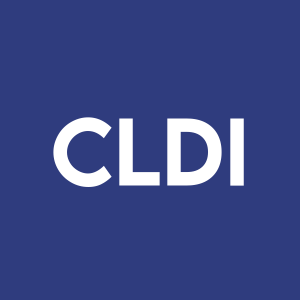Calidi Biotherapeutics and City of Hope Provide Update on a Phase 1 Clinical Trial with CLD-101 Virotherapy in Patients with Recurrent High-Grade Glioma
Rhea-AI Summary
Calidi Biotherapeutics (NYSE: CLDI) and City of Hope have reported progress on their Phase 1 clinical trial evaluating CLD-101, a neural stem cell-based oncolytic virotherapy for recurrent high-grade glioma. The trial, which is the first to assess a multiple-dose regimen of this novel treatment, has successfully treated 14 participants with up to four weekly intracerebral doses.
The study, supported by a $12 million award from the California Institute for Regenerative Medicine (CIRM), is currently enrolling participants for the highest treatment schedule. Dr. Jana Portnow, co-director of City of Hope's Brain Tumor Program and principal investigator, reported that all treatments have been well-tolerated.
The trial has expanded to include Northwestern University Feinberg School of Medicine and Stanford University Hospitals. The technology, licensed from the University of Chicago on behalf of City of Hope and University of Alabama, aims to improve clinical outcomes using stem cell technology to deliver oncolytic virus payloads to cancer sites.
Positive
- All treatments well-tolerated in 14 patients
- Successfully progressing to highest treatment schedule
- Trial expanded to additional prestigious institutions
- Secured $12M CIRM funding support
Negative
- Early Phase 1 stage with no efficacy data reported yet
News Market Reaction
On the day this news was published, CLDI declined 3.51%, reflecting a moderate negative market reaction.
Data tracked by StockTitan Argus on the day of publication.
SAN DIEGO and LOS ANGELES, March 26, 2025 (GLOBE NEWSWIRE) -- Calidi Biotherapeutics, Inc. (NYSE American: CLDI) (“Calidi”), a clinical-stage biotechnology company developing a new generation of targeted antitumor virotherapies, and City of Hope, one of the largest and most advanced cancer research and treatment organizations in the United States, are pleased to jointly announce progress from a phase 1 clinical trial utilizing Calidi’s CLD-101 investigational agent (neural stem cell-based oncolytic virotherapy) that is administered intracerebrally. This trial is the first to evaluate the safety and therapeutic potential of a multiple-dose regimen of this novel virotherapy for recurrent high-grade glioma - among the most aggressive and deadly forms of brain cancer.
Conducted by City of Hope, which has a National Cancer Institute-designated Comprehensive Cancer Center known for its pioneering research, this physician-sponsored phase 1 trial is assessing the safety and feasibility of delivering up to four weekly intracerebral doses of CLD-101. To date, 14 participants have been treated and all treatment has been well tolerated. The study is currently enrolling participants to the highest treatment schedule.
“We are optimistic about the initial results in these first 14 patients. I am especially encouraged by cohort 4 as we keep enrolling participants in this highest treatment schedule,” said Dr. Jana Portnow, co-director of City of Hope’s Brain Tumor Program and the trial’s principal investigator. This clinical trial is now also open at Northwestern University Feinberg School of Medicine and Stanford University Hospitals, both globally recognized institutions in cancer research and treatment.
Dr. Karen Aboody, City of Hope professor in the Department of Stem Cell Biology and Regenerative Medicine, Division of Neurosurgery, has played a critical role in developing this approach alongside Dr. Portnow. Their collaboration secured a
“We are dedicated to improving clinical outcomes of cancer patients with the use of stem cell technology to deliver oncolytic virus payloads to cancer sites,” said Allan Camaisa, CEO and Chairman of Calidi. “Together with our systemic, enveloped virus platform, I believe we are developing a portfolio of products to address glioblastoma, solid tumors and metastatic cancer.”
Calidi licensed the technology from the University of Chicago, on behalf of City of Hope and University of Alabama. City of Hope has a financial interest in the technology.
Dr. Aboody, an inventor of the technology, has a financial interest in Calidi and is a paid advisory board member.
For more information about this trial, contact fbidmeshki@coh.org or 626-218-4062.
About Calidi Biotherapeutics
Calidi Biotherapeutics (NYSE American: CLDI) is a clinical-stage immuno-oncology company with proprietary technology designed to arm the immune system to fight cancer. Calidi’s novel stem cell-based platforms are utilizing potent allogeneic stem cells capable of carrying payloads of oncolytic viruses for use in multiple oncology indications, including high-grade gliomas and solid tumors. Calidi’s clinical stage off-the-shelf, universal cell-based delivery platforms are designed to protect, amplify, and potentiate oncolytic viruses leading to enhanced efficacy and improved patient safety. Calidi’s preclinical off-the-shelf enveloped virotherapies, are designed to target disseminated solid tumors. This dual approach can potentially treat, or even prevent, metastatic disease. Calidi Biotherapeutics is headquartered in San Diego, California. For more information, please visit www.calidibio.com.
About City of Hope
City of Hope's mission is to make hope a reality for all touched by cancer and diabetes. Founded in 1913, City of Hope has grown into one of the largest and most advanced cancer research and treatment organizations in the U.S., and one of the leading research centers for diabetes and other life-threatening illnesses. City of Hope research has been the basis for numerous breakthrough cancer medicines, as well as human synthetic insulin and monoclonal antibodies. With an independent, National Cancer Institute-designated comprehensive cancer center that is ranked top 5 in the nation for cancer care by U.S. News & World Report at its core, City of Hope brings a uniquely integrated model that spans cancer care, research and development, academics and training, and a broad philanthropy program that powers its work. City of Hope’s growing national system includes its Los Angeles campus, a network of clinical care locations across Southern California, a new cancer center in Orange County, California, and cancer treatment centers and outpatient facilities in the Atlanta, Chicago and Phoenix areas. City of Hope’s affiliated group of organizations includes Translational Genomics Research Institute and AccessHopeTM. For more information about City of Hope, follow us on Facebook, X, YouTube, Instagram and LinkedIn.
Forward-Looking Statements
This press release may contain forward-looking statements for purposes of the “safe harbor” provisions under the United States Private Securities Litigation Reform Act of 1995. Terms such as “anticipates,” “believe,” “continue,” “could,” “estimate,” “expect,” “intends,” “may,” “might,” “plan,” “possible,” “potential,” “predicts,” “project,” “should,” “towards,” “would” as well as similar terms, are forward-looking in nature, but the absence of these words does not mean that a statement is not forward-looking. These forward-looking statements include, but are not limited to, statements concerning upcoming key milestones (including the reporting of interim clinical results and the dosing of patients), planned clinical trials, and statements relating to the safety and efficacy of Calidi’s therapeutic candidates in development. Any forward-looking statements contained in this discussion are based on Calidi’s current expectations and beliefs concerning future developments and their potential effects and are subject to multiple risks and uncertainties that could cause actual results to differ materially and adversely from those set forth or implied in such forward-looking statements. These risks and uncertainties include, but are not limited to, the risk that Calidi is not able to raise sufficient capital to support its current and anticipated clinical trials, the risk that early results of clinical trials do not necessarily predict final results and that one or more of the clinical outcomes may materially change following more comprehensive review of the data, and as more patient data becomes available, the risk that Calidi may not receive FDA approval for some or all of its therapeutic candidates. Other risks and uncertainties are set forth in the section entitled “Risk Factors” and “Cautionary Note Regarding Forward-Looking Statements” in the Company’s Registration Statements filed with the SEC on (i) Form S-4 filed on August 2, 2023 and the corresponding prospectus filed on August 4, 2023, and (ii) on Form S-1 filed on April 15, 2024, and the Company’s periodic reports filed with the SEC on (i) Form 10-K filed on March 15, 2024, (ii) Form 10-Q filed on May 14, 2024, (iii) Form 10-Q filed on August 13, 2024, and (iv) Form 10-Q filed on November 12, 2024. These reports may be amended or supplemented by other reports we file with the SEC from time to time.
Corporate Communications:
Dave Gentry, CEO
RedChip Companies, Inc.
1-407-644-4256
CLDI@redchip.com
Letisia Marquez
City of Hope
1-626-476-7593
lemarquez@coh.org
Source: Calidi Biotherapeutics, Inc.






